The Capital



 Karen Lee, President
Karen Lee, President
Capital Chapter! You deserve a round of applause! Your support has ignited an energy and enthusiasm in our chapter that is reminiscent of past years and has put us well on our way...Back To the Future and beyond! This is a historic time for the Capital Chapter and you have taken the baton!
The Change of Gavel meeting at Joe’s Seafood in March was such an inspiring event. The celebration was well attended by members and Business Partners, who came to thank the outgoing Board and welcome the incoming Board. President Janeanne Gorman bestowed the President’s Award to three incredibly deserving members (Barbara Kernus, Angela Tyson and Melody Watson) before becoming our newest Immediate Past President and receiving our ceremonial gavel and a donation of $5,000 made in her honor to the ALACC Foundation.
( Continued on the following page )
` Live from the Desk: President’s Message
` Welcome New Members & Business Partners
` Chapter Member Anniversaries
` Business Partner Spotlight
` Business Partner Success Stories
` Breaking News!
` Community Spotlight – Human Resources
` Save the Date - Upcoming Events
` Previously On...
` Chapter/Member Wins and Appreciation
` Legislation! What is Trending?
` Community Engagement
` Click here to view our Administrative Committees.
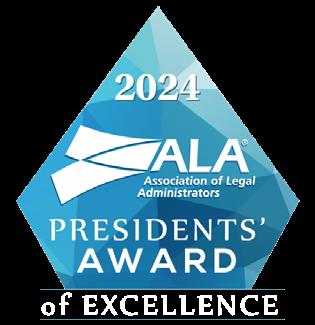



2024 continues to be a busy and momentous year for the chapter. We received the ALA Presidents’ Award of Excellence for our chapter leadership and we hosted well attended networking events and community meetings facilitated by our committee chairs and our local and national Business Partners.
Look for upcoming sessions on personal and workplace safety in the DC work environment; how best to navigate “bad actors” online during the holiday season and so much more - all FREE for members!
It gets even better! Based on your feedback, we reinvented our platforms and expanded our Capital Chapter footprint by offering our sessions to ALA members nationwide, organically building stronger relationships with other chapters; and providing more educational opportunities and exposure for our members and Business Partners.
We didn’t stop there, we restructured educational sessions, updated new member and Business Partner orientations, ramped up our networking events, and refreshed our weekly and quarterly communications. This strategy is working, we’ve increased session registrations by at least 50% and are truly making a Capital Connection.
What’s next? Board members just attended the ALA National Conference in Aurora, CO in late May, followed by the Chapter Leadership Institute in Salt Lake City in July. The Toni K. Allen Scholarship Presentation and Quarterly Networking Luncheon are scheduled for July 24 at Modena Restaurant (registration is open now).
We’re excited to be able to meet in person to experience live presentations
and thoughtful exchanges. If you haven’t done so already, I invite you to join or sit in on one of our committee meetings (HR, DE&I, Legal Ops, or Small Firm & Branch Office) and get a front row seat to the Capital Chapter. Our “rock star” chairs and co-chairs are ready to welcome you (Virginia Hannums, Denise Fidura, Tiffany Montgomery, Deorsay Pratt, Christina Albert, Monique Terrell and Christina Weber).
I understand your hectic daily schedules and the continued struggle navigating new workplace landscapes. Consider participating at your own pace. Your participation no matter how big or small means more diverse programs, discussions and events. If you want more, we can help! Join other ALACC members who participate on multiple committees and have even accepted the significant role of ALACC Board member. The chapter work of some ALACC members has been so impactful that a few were recently selected to share their expertise in ALA national roles (Ericka Brundage, Fawn Elzie and yes me too!). We even have two members who were selected for the prestigious Susan L. French Emerging Leader Fellowship Program (Ericka Brundage and Joanna Hurt).
To say that I am inspired and encouraged by your support and energy is an understatement. I look forward to hearing your ideas and partnering with you to find strategic ways to continue the great work being done in our chapter.
Wishing you a great summer season!
Best regards,

President
Karen Lee
Jones Robb PLLC
President-Elect
Marie Woods
Van Ness Feldman LLP
Immediate Past
President
Janeanne Gorman HWG LLP
Secretary/Treasurer
Shera Berini
Harris St. Laurent & Wechsler LLP
Secretary/ Treasurer-Elect
Linda Padron
Kaplan Hecker & Fink LLP
Vice President, Business Partner Advisory
Tania Jose
Baker Hostetler
Vice President-Elect, Business Partner Advisory
Fawn Elzie
Kobre & Kim LLP
Vice President, Community Services
Dr. Joel Chagadama GKG Law, PC
Vice President-Elect, Community Services
Ericka Brundage
Merchant & Gould
Vice President, Diversity, Equity, & Inclusion
Tiffany Montgomery
Saul Ewing Arnstein
Vice President-Elect, Diversity, Equity, & Inclusion
Deorsay Pratt
Gilbert LLP
Vice President, Communications
Joanna Hurt
McCarter & English, LLP
Vice President-Elect, Communications
Emmanuel Adedigba Elias Law Group LLP
CHAPTER STAFF
Senior Director
Carol Montoya
Executive Director
Erika Freundel

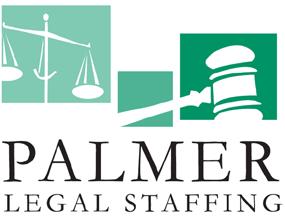
The Capital Connection is published on a quarterly basis for members of the Capital Chapter of the Association of Legal Administrators to provide information for the education and benefit of legal administrators, law office managers, managing partners of law firms, and other law related associations. Capital Connection is not engaged in rendering legal, financial, or tax counseling or advice through this publication. The contents of all articles, letters, videos, and advertisements published in Capital Connection should not be considered endorsements by the Capital Chapter of ALA nor the opinion expressed therein of any products advertised. Contributing authors are requested and expected to disclose financial and/or professional interests and affiliations that may influence their writing position. Articles and materials accepted for publication are subject to editing by the editorial team and become property of the Capital Chapter of the Association of Legal Administrators. Links to Capital Connection may not be shared without permission from the Chapter.


Thank you for joining us!
` Victoria Zay Grossberg, Yochelson, Fox & Beyda LLP
` Barbara Darby Klein Hornig LLP
` Jocelyn Hughes ......................................................................... Baker Botts LLP
` Yllek Figueroa White & Case LLP
` Eric Hagopian ................................................................. Van Ness Feldman LLP
` Mary Hester Dechert LLP
` Renee Butler HWG LLP



Each quarter, we get to ring in a number of member anniversaries. Thank you for your time and the commitment you have shown to the Chapter. We are grateful to have dedicated and loyal members like you!
5 YEARS
Anat Allal – Van Ness Feldman LLP
Gretchen Condy – Baker & Hostetler LLP
James Cornell – Shook, Hardy & Bacon, LLP
Michelle DaSilva – Wiley Rein LLP
Beth Davidson – Mayer Brown LLP
Allison Gouker – Willkie Farr & Gallagher
Viriginia “Ginger” Hannums –Klein Hornig LLP
Simon John – Cadwalader, Wickersham & Taft LLP
Beverly Miller – Crowell & Moring LLP
10 YEARS
David Anderson – Lerch, Early & Brewer, Chtd.
Emily Christianson – Loeb & Loeb
Lynn Edwards-Hall – Womble Bond
Dickinson (US) LLP
Denise Johnson – Troutman Pepper
15 YEARS
Natalie Huddleston – Pierce Atwood, LLP
Althea Hunt – Piliero Mazza
Heather Kurey – O’Melveny
Ellen Love – Mintz
20 YEARS
Claudia Baragano – Kelley Drye & Warren LLP
Janice Byrum-Jackson – Hunton Andrew Kurth LLP
25 YEARS
Herbert Abercrombie – Jenner & Block LLP
Lula Ivey – Nossaman LLP
Mark Young – Skadden Arps et. al.
Starr Pratt – Feldesman Tucker Leifer Fidell LLP
Maiko Price
Holly Schroeder – Lewis Baach Kaufmann Middlemiss PLLC
Ana Sobalvarro – Vetta Tabb
Lynda Tompkins – Husch Blackwell
Robin Walsh – Epstein Becker Green PC
Marilyn Williams – Kellogg, Hansen, Todd, Figel & Frederick, PLLC
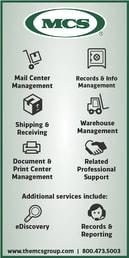
Karen Lamelle – Oblon, McClelland, Maier & Neustadt, LLP
Diana Nelson – DUNCAN, WEINBERG, GENZER & PEMBROKE
Nicole Rutherford – Van Ness Feldman LLP
Erica White – Lerch, Early & Brewer, Chtd.

Nawel Moreno – Caplin & Drysdale, Chartered
Carrie Sadowski – Pillsbury Winthrop Shaw Pittman LLP
30 YEARS
Barbara Mannix – Fish & Richardson PC
Susan Sheehan
35 YEARS
Margaret Gainer – Leydig, Voit & Mayer
45 YEARS
Barry Strauss – Legal Strategies Group

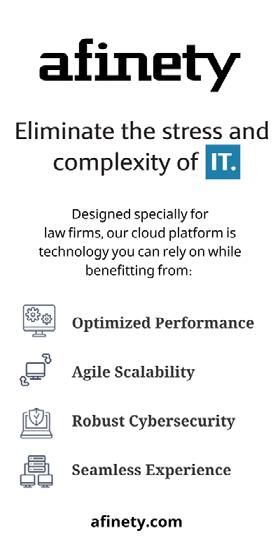
As the legal workplace undergoes a significant shift—driven by accelerated trends and factors such as hybrid work, real estate costs and talent pressures—law firms can struggle to balance office attendance policies with the need for efficient space utilization. During this period of transition and evolution, it’s essential that the office space supports a law firm’s culture and goals. To address this concern, here are five valuable tips to help navigate this ever-evolving landscape.

To address the importance of intangible factors and cultural concerns, firms are focusing on fostering meaningful professional relationships and promoting development through intentional mentorship programs and increased leadership access. This approach actively prioritizes engagement rather than passively expecting these activities to occur naturally.
Ideally, the office environment reflects the firm’s values, especially as clients are increasingly curious about a law firm’s environmental, social and governance (ESG) practices. Law firms should seek to prioritize sustainability and demonstrate a commitment to environmental responsibility. CBRE’s 2023 Sustainability Report reveals that sustainability is a top priority for organizations in Washington, D.C. The D.C. government is implementing stricter environmental building codes with a goal of carbon neutrality by 2045.
Leadership at many firms encourages partners and associates to spend time in the office for collaboration and learning purposes. The approach to hybrid policy may vary depending on the current
strength of the talent market and the preferences of firm leadership. By demonstrating to associates and partners the positive impact that in-person knowledge can have on their work, you will improve the culture and increase crosscollaboration between practice groups.
Law firms are increasingly investing in occupancy management technology to optimize their real estate portfolios. In the post-pandemic era, doing more with less space has become a leading strategy. By utilizing centralized real estate strategies and leveraging technology, firms can justify portfolio optimization and make informed decisions regarding their office spaces.
CBRE’s 2024 Law Firm Benchmarking Results Report provides insight into how firms across the country are implementing smart occupancy strategies to get the most out of their space. We have seen firms look to implement hoteling for a portion of the population that is not regularly in the office or lives too far from the office to commute in regularly. Other trends we have seen, as illustrated below, include: 87% of larger firms have already implemented or plan to

implement universal office sizes and 66% are moving towards smaller offices as well to improve efficiency and reduce costs.
As law firms observe hybrid work stabilization, they are beginning to find solutions and focus on space efficiency. Younger generations bring fresh perspectives to leadership positions and are challenging the status quo to create cost savings and modern office designs. Unlike other industries, law firms are prioritizing client confidentiality and opting for smaller attorney offices rather than hoteling or office sharing. We have seen a push to incorporate a more residential and/ or hospitality look and feel to the office. Office design is focused on giving attorneys different locations to work from throughout the office as well as providing enhanced formal and impromptu meeting spaces.
Law firms continue to adapt to the long-term changes brought about by the pandemic by actively seeking new and improved office spaces. The office environment plays a crucial role in both brand and business development, as it attracts top talent and creates a positive impression on clients. Law firms are investing in updates to their pre-pandemic spaces to
align with the demands of a post-pandemic reality. We continue to see law firms trade up for newer buildings, which are welllocated, with improved amenities.
Successful law firm offices need to balance flexibility, privacy, collaboration and socialization to support productivity and relationships. For additional insight on how top law firms across the country are managing their real estate portfolios, read CBRE’s 2024 Law Firm Benchmarking Results.
As you’re looking towards your firm’s talent and client goals for 2024 and beyond, ensure real estate is a meaningful part of your firm’s success.
CBRE is a real estate firm that understands the legal industry, representing 30% of the AM Law 200 firms with locations in D.C. and holding the #1 market share. Ben Plaisted and Greg Scheipers have been partners and advisors to law firms in D.C. for over 20 years. Their client-centric approach goes beyond finding office space—Ben and Greg ensure that real estate is a meaningful contributor to your firm’s business goals.
Contact Ben: ben.plaisted@cbre.com, 202-679-6146
Contact Greg: greg.scheipers@cbre.com, 202-480-5026




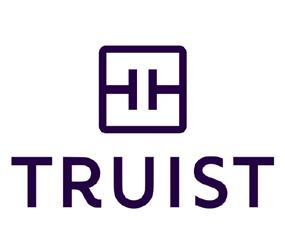

Office downsizing has been the go-to, costcutting corporate strategy since the pandemic strained corporate profits and transformed how and where workers worked. But not anymore, according to Jim Durfee, General Manager of Office Movers Express (OMX).
Last year OMX, a Beltsville, MD.–based office mover exclusively serving businesses, relocated over 150 regional firms. Yet only 25% were downsize moves, compared to nearly 80% immediately following the pandemic. Mr. Durfee says three-quarters of their office moves in 2023 were actually part of a rightsizing strategy. And the majority of those moves were by DC law firms.
“Downsizing and rightsizing are often used interchangeably with rightsizing simply thought of as a positive spin on downsizing. But they really have separate meanings” said Mr. Durfee. Downsizing is a cost-cutting, one-time tactic that entails across-the-board employee cut-backs and relocation to smaller, less expensive space. While rightsizing might also include relocation and staff reductions, it is more about maintaining the right amount of human and physical resources. Its focus is on maximizing profits by creating organizational and operational efficiencies, while also enhancing work/life accommodations and amenities.”
HR departments are reimagining their structural and staff needs to fit new realities, including an anticipated 22% of full-time employees working remotely
by 2025 Forbes). So management is employing rightsizing strategies to:
` optimize space utilization
` eliminate equipment redundancies
` identify employees whose skills and roles no longer align with current business goals
` recruit additional hires with skillsets that better support evolving corporate priorities.
For DC law firm Stein Mitchell Beato & Missner rightsizing meant “re-engineering and re-evaluating office space usage based on current needs”, according to firm administrator Pennie McKinney. And that meant moving to a better neighborhood, modernizing their work environment, and upgrading amenities.
The lure of newer office buildings is evidenced by the fact that the overall downtown DC office vacancy rate at the end of 2023 was a staggering 21.2% (Commercial Observer), but according to commercial real estate firm Avison Young, vacancy rates for trophy office space were nearly half that at 11.5%. And, while 40% of respondents in a CBRE law firm survey indicated they expected their office footprint to get moderately smaller, any relocation wouldn’t be for lower rents in an older office building.
“We’ve seen that when a company does employ a rightsizing strategy space efficiency becomes a high priority,” said Mr. Durfee. “Large bulky built-in furniture
has been replaced with modern sit-stand desks, shared workstations collaborative spaces and the newest trend, hot-desking, with desks being un-assigned and used by different workers at different times on an as-needed basis.”
While it might be too early for longterm forecasts, the pandemic did spawn a fresher, leaner, more dynamic business response to economic shifts. The focus now is more on objectives and needs, and
putting the right people in the right places, instead of strictly cutting costs.
Office Movers Express (OMX) has been serving business in DC, Maryland and northern Virginia since 1981. The firm also provides office decommissioning services as well as short and long-term storage in its two climate-controlled, videomonitored warehouses.
Contact Jim: jim.durfee@moveomx.com
In the dynamic world of legal administration, the integration of AI tools such as CoPilot AI and ChatGPT is ushering in a major shift in how tasks are managed and workflows are optimized. These advanced technologies offer businesses new opportunities to streamline processes, increase efficiency, and deliver exceptional outcomes. However, alongside their promise, there are challenges and considerations that legal administration groups must address to take full advantage of the benefits of AI. Let’s delve into CoPilot AI, ChatGPT, and other AI tools and address the challenges and impact they have on the legal administration space, including how embracing these technologies can lead to organizational-wide change.
At its core, CoPilot AI, ChatGPT, and other AI tools are powered by sophisticated algorithms that enable natural language processing, automation, and intelligent decision-
making. These capabilities can empower legal professionals to perform a wide range of tasks more efficiently and accurately than ever before. From drafting legal documents to analyzing case law and managing client communications, AI tools offer a multifaceted solution that enhances productivity and effectiveness across the board.
In a recent webinar we hosted with a local Association of Legal Administrators chapter, we review and demo how Copilot AI can help admins:
` Write up or template out legal documents that are typically routine in nature.
` Help with meeting tasks like writing out agendas and summarizing meeting notes.
` Analyze complex or large data sets, providing only the important highlights.
` Manage your calendar and time more effectively by assisting in building a schedule that helps you achieve more.
( Continued on the following page )


( Continued from page 9 )
If you are interested in watching our latest webinars about Copilot AI and how it can help your firm, please reach out to our team for a copy here
As legal administration groups begin to integrate AI tools into their workflows, several challenges and considerations need to be addressed. One of the foremost concerns is the ethical use of AI, particularly in sensitive areas such as legal research and document review. Ensuring transparency, accountability, and fairness in AI-driven decisionmaking processes is essential to maintain trust and ethical standards within the legal profession.
We would also caution that some AI tools are limited in the data it can pull from based on dates. For example, ChatGPT is only able to source the internet records up to 2023. Also, when using AI tools that pull from public sources like the internet, you need to be sure you are proof reading and verifying the information it returns.
Furthermore, the way AI tools can operate with existing systems and processes poses a technical challenge that must be addressed. We understand that in the legal space, firms use a series of document management tools. Seamless integration with practice management software, document repositories, and communication platforms is crucial to maximize the benefits of using AI and minimize disruptions to workflow continuity.
The impact of AI tools on the legal space is profound and far-reaching. By
automating routine tasks and providing intelligent assistance, AI tools enable legal professionals to focus their time and expertise on high-value activities that require human judgment and creativity. This accelerates the pace of work and enhances the quality and accuracy of outcomes, benefiting both clients and stakeholders. With time better spent, legal firms allows people to do more and faster – and with AI technology you can enable your teams to a new level.
In conclusion, the challenges and impact of AI tools on the legal industry could be significant, but the opportunities they present for innovation and progress are equally compelling. By embracing AI as a strategic enabler rather than a threat to traditional roles, legal administration groups can harness its capabilities to drive positive change, enhance efficiency, and deliver greater value to clients. To fully realize the potential of AI tools, legal administration groups must adopt a proactive approach to technology, investing in training, education, and organizational support structures that empower employees to leverage AI effectively. By fostering a culture of innovation and continuous learning, legal administration groups can position themselves at the forefront of technological advancement and lead the industry toward a future of enhanced excellence.
Contact Brian: Info@fusiontek.com
Artificial intelligence, economic uncertainty, overextended resources, shrinking budgets, renewed governmental regulatory oversight … do these sound like headaches for your legal department? If so, you’re not alone. A recent survey of general counsel and chief legal officers revealed that 87 percent expect increased risk for their companies in 2024.
The General Counsel Report 2024:
Tipping Points in Strategy, Technology, Adoption and Operations, by FTI Technology and Relativity, contains interview takeaways from 60 leaders worldwide serving as the general counsel or chief legal officer of their organizations.
Survey participants were asked to list their top five risk areas. More than half listed these concerns in their top five:
` Regulatory compliance (92 percent)
` Data privacy (80 percent)
` Data protection (80 percent)
` Implications of advanced technology (55 percent)
` ESG (53 percent)
` Increased number of disputes and investigations (50 percent)
One U.S.-based general counsel told the survey: “We are now in a regulatory tsunami given the uncertainty in the economy, geopolitical concerns and AI, which leads people to want to control what they can control.”
Why are legal department leaders worried about these risks and their ability to mitigate them? Survey respondents said their companies are consolidating work and overextending employees as they focus on growth.
One respondent said: We are globalizing our systems, but not adding new technology. We are not getting any increased budgets.”
General counsel always plays a crucial role in managing risk while managing resources and supporting their client’s growth. In a time of increasing regulatory scrutiny, the criticality of that role is heightened. Building a flexible and resilient in-house team with proper technology and external partners is essential to navigating these choppy waters. Below are a few key initiatives to consider as you prepare for the year ahead:
` Prioritize legal services: Align your legal workload with business impact rather than solely on partner requests. With limited resources, some less urgent projects may have to take a back seat.
` Strategically diversify partner support: Take a strategic approach to your legal service providers, including law firms, technology partners, and litigation support providers. Leveraging lower cost options for different tasks helps reduce expenses and eliminates ( Continued on the following page )


( Continued from page 11 )
reliance on one provider. For example, utilize managed review attorneys for routine matters at a fraction of the cost and allow the higher priced attorneys to focus only on the high-level strategic matters (tip – you can contact me for help with this).
` Negotiate alternative fee arrangements: Many firms will handle routine corporate governance and SEC compliance on a fixed fee basis at a reduced hourly rate. Utilize an RFP process to ensure you get the best arrangement.
` Standardize high volume legal workflows: Leverage technology and contract workflows that allow business leaders to complete routine legal matters, like NDAs, on their own with standardized templates.
These are just a few ideas to consider, but every organization and department
is different, and you need to tailor the structure of your department and outside resources to fit your needs. Ultimately, remember the old adage –work smarter, not harder. The regulatory tsunami may (or may not) appear but, regardless, you will never regret taking the time to build systems and procedures that you can leverage when the inevitable (stuff) hits the fan.
Brian Roberts is Chief Legal Officer at Array and the host of The Attorney Lounge, a podcast about life, law and business. Tune in wherever you get your podcasts, or click here, to hear compelling stories of accomplished attorneys, legal professionals and industry veterans sharing their inspiring personal stories and discussing the latest trends and ideas in the business of law.
Contact Brian: brian.roberts@trustarray.com
The U.S. Equal Employment Opportunity Commission (EEOC) Notice:
The 2023 EEO-1 Component 1 data collection opened on Tuesday, April 30, 2024. The deadline to file is 11:00 pm EST on Tuesday, June 4, 2024. The EEOC requires electronic submission of EEO-1 Component 1 report(s) through a webbased data collection application referred to as the EEO-1 Component 1 Online Filing System (OFS). The OFS is accessible here
For more details, visit EEOC
The article was written for publication by Eugenia
A recent survey found that 40% of employers have encountered employees who left their jobs to find employment with better benefits. Additionally, 1 in 10 workers would accept a pay cut in order to get better benefits. One way to assess where your company is and plan for the future is through an annual benefits review.
An annual benefits review is an opportunity for your business to sit down and take a look at what you’re doing right and what you’re doing wrong. In the same way that you take time to review employee performance and see how they are doing, it’s a good idea to review how you’re doing!
47% of companies say that keeping competitive benefits packages is one of their biggest challenges. If you aren’t regularly sitting down to see where you are, it’s hard to know whether you are competitive or if you might be losing out on top talent due to your benefits package. What are some of the benefits of performing an annual benefits review?
An annual benefits review is an opportunity to review and consider employee feedback. Have you heard from any new employees or current employees during surveys that your benefits are part of what attracted them to your company? By listening to direct feedback from your employees, you can ensure that you are
Wright, TriBridge Partners.responding to their expectations and taking action to improve employee satisfaction.
Attracting top talent is important for businesses of every size and in every industry, and an annual benefits review can help you meet your recruitment goals. Your review will allow you to confirm that your benefits package is still in line with industry standards and expectations.
80% of companies think that employees are highly satisfied with the benefits that they offer. However, only 58% of employees report a high level of satisfaction. When you are performing an annual benefits review, make sure that you know what to look for. It’s a good idea to look at the benefits packages of your competitors. Are they offering anything that you aren’t? Have they changed since the last time that you checked them? 5% more companies are now offering paid maternity and paternity leave, and 19% of companies are offering paid mental health - separate from traditional vacation or sick time.
Another factor to consider is if you are offering enough customization for your employees. One recent study found that 74% of employees prefer the ability to customize their benefits so that they are able to meet their needs. Today’s consumers expect a tailored experience, and your employees are no different. Remember that those of different ages and life stages don’t necessarily want totally different benefits, they simply might want to be able to tailor their specific benefits differently.








The chapter has the following events planned. To view more information, click directly on the event. We hope you can join us!
MAY
5/29 Executive Committee Meeting
JUNE
6/3 Deadline for Susan L. Francis Fellowship Application
6/5 DEI Committee Meeting
6/6 Education Session: AI For Legal Administrators: A Practical Guide
6/11 HR Community Meeting
6/17 Executive Committee Meeting
6/25 Small Firm & Branch Office Meeting
7/3 DEI Committee Meeting
7/9 HR Community Meeting
7/15 Executive Committee Meeting
7/187/20 ALA Chapter Leadership Institute
7/23 Small Firm & Branch Office Meeting
7/24 Toni K. Allen Scholarship Presentation & Networking Lunch
Thank you to everyone that attended our Change of Gavel Luncheon in March! Click here to see photos from the event!

MISSED AN EVENT?
Be sure to check out the ALA Capital Chapter Calendar of Events for all upcoming events and educational sessions.
At Change of Gavel this year, nowPast President, Janeanne Gorman, presented three outgoing ALA Capital Chapter board members, Barbara Kernus, Angela Tyson, and Melody Watson, with the 2023 President’s Award for their outstanding contributions to the Capital Chapter.
Over the past year, Barbara Kernus served as the Vice President of Community Service and was vital to fundraising as well as running the Toni K. Allen Scholarship program. Through raffle tickets, donation pledges, and a Silent Auction at the Capital Chapter’s holiday party, Barbara contributed to the Foundation’s scholarship fund. Barbara also reviewed applications, formed an interview committee, and awarded a $12,500 scholarship to Alexander Liesegang in July 2023 towards his education at University of California Davis. The Capital Chapter truly appreciates all the work Barbara did this past year for the Chapter.
Angela Tyson served as the Vice President of Diversity, Equity & Inclusion. Angela led the DEI Committee with monthly engaging roundtables. In 2023, Angela planned a special presentation to honor Black History Month, Mr. Ryan Jones presented a Virtual Tour of the National Civil Rights Museum in
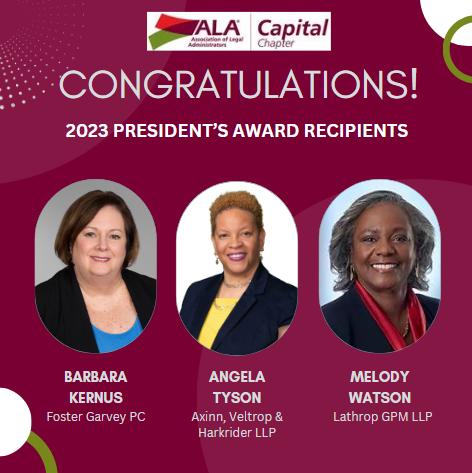
Memphis, Tennessee. To honor Women’s History Month in March, Angela invited Elizabeth Weitzman, an award-winning journalist and speaker, to offer a presentation entitled “Hollywood on Trial: Images of Women in Law.” Angela’s commitment to the Capital Chapter and dedication to DEI is truly admirable.
Melody Watson has held many positions on the ALA Capital Chapter board, but most recently she was the Secretary/Treasurer. Throughout this past year,
Melody kept the ALA Capital on track and on budget. After the pandemic, the structure of our budget changed, and Melody helped make sure the Capital Chapter could continue to provide events and education to help further legal professionals in the DC area. Melody often shared meaningful insights into Chapter needs as well as ideas for the Chapter during board meetings. She is truly an amazing contributor to the ALA Capital Chapter.
Current legislation is particularly affecting law firms and their practices regarding employment law. The DMV region has seen the enactment of new legislation aimed at strengthening protections against employment discrimination. Employers, including law firms, are now mandated to adhere to more stringent guidelines regarding hiring practices, workplace conduct, and handling of discrimination complaints.
The District of Columbia has banned non-compete agreements
and policies for employees. As of January 1, 2024, the restriction on non-compete clauses applies to employees earning $154,200 or less and to medical specialists earning $257,000 or less. Click here for more information.
(D.C. Pay Transparency Laws): The new law is scheduled to go into effect on June 30, 2024. Washington, D.C. will require employers to share expected salary ranges in job posts/ads and to avoid using candidates’
compensation history when setting salaries and disclose the healthcare benefits that will be offered with the position, before the first interview. Employers will not be able to require that an applicant’s wage history fall within a certain range. Employers cannot request or require an applicant to disclose his/her wage history, nor may an employer ask a former employer about an applicant’s wage history. Employers are prohibited from retaliating against employees who discuss compensation. For more details on the Act, visit DC Law Library.